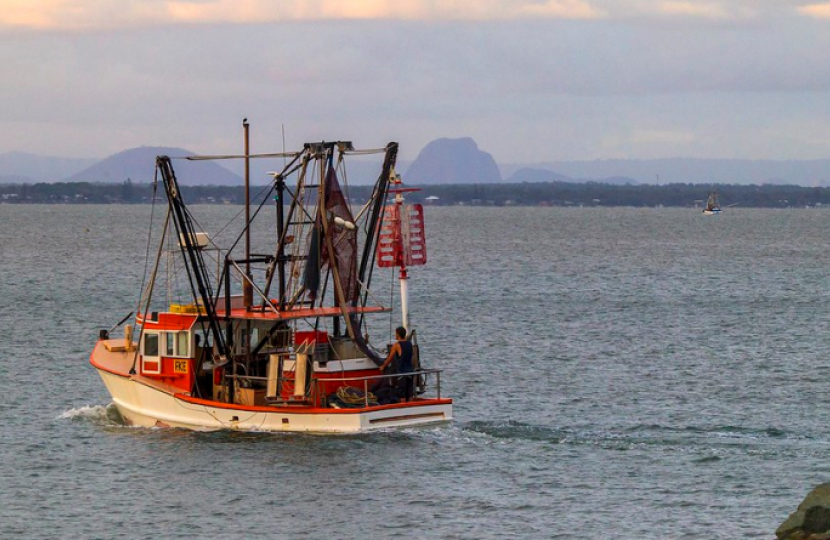
Fisheries & Marine Protected Areas
***September 2022 Update***
The Fisheries Act enshrines in law the Government’s commitment to sustainable fishing through its objectives and fisheries statements and through the new legal commitment to producing Fisheries Management Plans (FMPs) to restore our fish stocks to sustainable levels. The Act contains a ‘bycatch objective’ seeking to reduce the wasteful practice of discarding fish; an ‘ecosystem objective’ to minimise and, where possible, eliminate negative impacts on marine ecosystems; and a new ‘climate change objective’ which recognises and seeks to reduce the impact of fishing on the health of our oceans and our planet.
The UK is at the forefront of marine protection with 374 Marine Protected Areas (MPAs) protecting 38% of UK waters. We have built a comprehensive network of MPAs and are focusing on making sure they are protected properly. 98 MPAs in English inshore waters already have bylaws in place to protect sensitive features from damaging fishing activities. The first four offshore Byelaws have now also been implemented, which ban bottom towed gear over sensitive habitats, and plans are in place to protect all offshore sites from damaging fishing activity by the end of 2024, using new powers in the Fisheries Act 2020. The Government has also committed to introducing Highly Protected Marine Areas (HPMAs) following the response to the ‘Benyon review’. We are now consulting on candidate pilot HPMAs.
The MMO recently launched a call for evidence on its draft fisheries assessment for the next 13 offshore MPAs. Ministers are considering policies for large pelagic trawlers and flyseining, working with the industry to develop more robust management of the non-quota species which these vessels are targeting, as well as quota stocks.
Since 2019, the UK has been leading the Global Ocean Alliance (GOA) of countries championing ambitious ocean action under the Convention on Biological Diversity (CBD), including the ‘30by30’ target to protect at least 30% of the global ocean by 2030. The ocean has historically been underrepresented in the CBD, and the GOA plays an important role in raising the profile of the ocean and marine issues.
In addition to leading the GOA, the UK also serves as Ocean Co-Chair of the High Ambition Coalition (HAC) for Nature & People, alongside Costa Rica and France. The HAC champions 30by30 for both the land and the ocean. Between these two UK-led alliances, 120 countries support 30by30 for the ocean, and over 100 countries support 30by30 for both the land and the ocean. The HAC and the GOA are complementary alliances, working closely together and pushing in the same direction to ensure that the 30by30 target is adopted at CBD COP15.
As we approach the 15th Conference of Parties (COP15) to the CBD in December 2022, the UK will continue working with Costa Rica, France, and members of the HAC and GOA, to call for the 30by30 target to be enshrined within the post-2020 Global Biodiversity Framework (GBF).
The UK is committed to securing an ambitious outcome at COP15, including ambitious outcomes for the ocean, to halt and reverse biodiversity loss globally by 2030. However, it is also crucial that we continue working after COP15 to support the global implementation of the GBF, including the 30by30 target.
In addition, the UK continues to provide support for marine protection internationally, including through the £500 million Blue Planet Fund. The Blue Planet Fund, financed from the UK overseas aid budget, will support developing countries to protect and sustainably manage their marine resources and address human-generated threats across four key themes: biodiversity, climate change, marine pollution, and sustainable seafood.
The Fisheries Act
The Fisheries Act enshrines in law the Government’s commitment to sustainable fishing through its objectives and fisheries statements and through the new legal commitment to producing Fisheries Management Plans to restore our fish stocks to sustainable levels. This builds on a manifesto commitment which promised to introduce a legal commitment to fish sustainably as we become an independent coastal state once again.
The Fisheries Bill has passed through Parliament, and become law. You can read it more about it here: https://services.parliament.uk/bills/2019-21/fisheries.html
The draft Joint Fisheries Statement (JFS) commits the UK Government and Devolved Administrations to work together to adopt an ‘ecosystem-based approach’ to fisheries that will underpin a vibrant, profitable fishing industry that is resilient to climate change. The JFS includes a list of proposed Fisheries Management Plans (FMPs) that will be published by the UK Administrations. FMPs are a cornerstone of the Government’s approach to fisheries management now that the UK has left the EU’s Common Fisheries Policy.
UK-EU Fisheries
The Trade and Cooperation Agreement between the UK and the EU recognises that the UK has sovereign control of its waters. During an adjustment period lasting 5 and a half years, there will be continued reciprocal access to each other’s waters at levels commensurate to each party’s share of fishing opportunities and, for non-quota stocks, at historic levels. This will allow fleets on both sides time to adapt to the new arrangements. At the end of the adjustment period, the UK will take back full control of its coastal waters and will have the sole right to determine access. From this point, access will be subject to annual negotiations alongside fishing opportunities.
